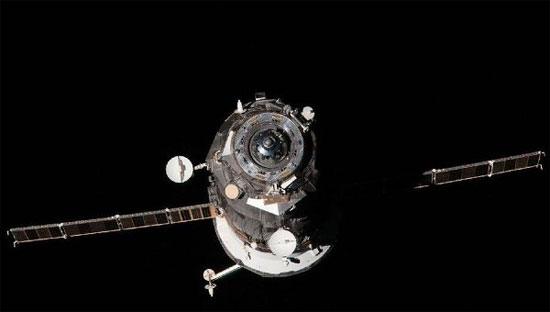Progress ship left ISS to perform experiments on orbit
Russia's Progress M-19M transport spacecraft, scheduled for June 11, will leave the International Space Station (ISS), starting a week-long flight to conduct orbital experiments , before "buried itself" in the Pacific Ocean.
The Progress M-19M ship will be separated from the Zvezda module on ISS at 20:59 on June 11 (VN time), the Russian Mission Control Center spokesman said.

Russian Progress transport ship - (Photo: NASA)
After leaving the station, the Progress M-19M will fly in orbit for a week to perform a radar system test of the physical properties of the ionosphere conditions around the spacecraft, caused by too Process of operation of propellant using liquid fuel.
On June 19, the ship will end its mission by stabbing the Pacific Ocean. The ship was launched into orbit by the Russian Federal Space Agency (Roscosmos) on April 24 from Russia's Baikonur Cosmodrome in Kazakhstan, carrying 2.5 tons of cargo, including fuel for stations and food, Drinking water and oxygen for astronauts.
It is known that the Progress ships are "backbones" in transporting goods and equipment to supply for ISS. In addition, it undertakes missions to help adjust the ISS trajectory with its propulsion and perform other experiments.
The departure of the Progress M-19M from the station also gave way to the European transport ship named Albert Einstein (ie ATV4) to the station on June 15. Albert Einstein left the launch pad at the Kourou Space Center in French Guiana on June 5, bringing 6.6 tons of cargo to supply to ISS.
The next Russian cargo ship, the Progress M-20M, is expected to leave Baikonur on July 28.
There are six working astronauts on the ISS currently serving the 36th International Flight Group, including commander Pavel Vinogradov and astronauts Fyodor Yurchikhin, Alexander Misurkin (Roscosmos's partner), Karen Nyberg, Chris Cassidy (same Mechanical NASA and Aerospace - NASA, Luca Parmitano (Italian, European Space Agency - ESA).
- Despite the incident, the supply ship still reached ISS
- ISS paves the way to welcome new supply ships
- The Progress M-11M spacecraft continues to stay in orbit
- Russian cargo spacecraft exploded as soon as it left the launch pad
- Russia: Freight ships cannot reach the expected orbit
- The ISS Progress spacecraft
- Russia launched new missiles on orbit
- Russia is about to launch a supply ship to ISS
- Progress transport ship docked at ISS
- Russia successfully launched the transport ship 'Progress M-28M' into orbit
- Russian spacecraft cannot access the space port
- Russia launched the M-21M Progress ship onto the ISS Space Station
 Van Allen's belt and evidence that the Apollo 11 mission to the Moon was myth
Van Allen's belt and evidence that the Apollo 11 mission to the Moon was myth The levels of civilization in the universe (Kardashev scale)
The levels of civilization in the universe (Kardashev scale) Today Mars, the sun and the Earth are aligned
Today Mars, the sun and the Earth are aligned The Amazon owner announced a secret plan to build a space base for thousands of people
The Amazon owner announced a secret plan to build a space base for thousands of people